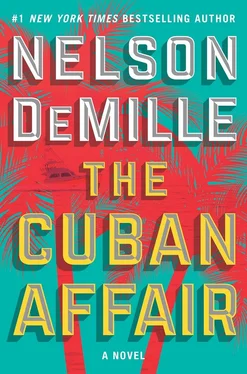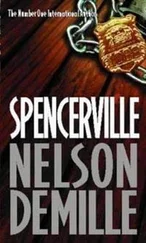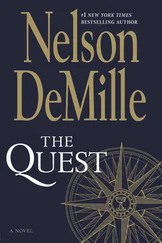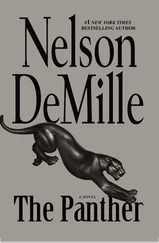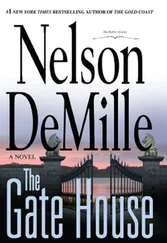Tad then spoke from his notes, and I actually found the lecture interesting. I learned about Son music, salsa, rhumba, reggaeton, and the African origins of a lot of Cuban music and dance. There was no time for Q&A, but Tad remembered to give us the names of some good nightclubs, including Floridita, the birthplace of the daiquiri, and where Hemingway used to hang out. Tad said, “His record was eighteen double daiquiris in one sitting. Don’t try to match that.”
I said to Sara, “We used to do that before breakfast at Bowdoin.”
On our way down the sweeping staircase to the lobby, Sara asked, “Did you enjoy that?”
“I did.”
“Cuban music and dance are one of the few things that the regime hasn’t changed or censored.”
So even the Commies like to see boobs and butts shaking. In some ways, Cuba was still Cuba. I said, “I’m a little Hemingwayed out, but we can go to Floridita after dinner if you’d like.”
“I think we should take a walk on the Malecón.”
“You’re a cheap date.”
We boarded the bus. José was still on duty and Antonio had reappeared in time for a free dinner.
On our drive to the Riviera, Antonio gave us some background on the hotel to make our dining experience more meaningful and beautiful. The Riviera, he told us, was built by the notorious American gangster Meyer Lansky, and opened in time for Christmas 1957. “But on New Year’s Day 1959,” said Antonio, “the Communist Party crashed Mr. Lansky’s New Year’s Eve party.”
That got a laugh from the Yalies — who had all seen Godfather II — and Antonio, who’d probably used that line a hundred times, smiled.
So, I thought, Meyer Lansky and his Las Vegas partners had made a bad bet on the Riviera Hotel and Casino and lost everything in one day. I wondered if any Mafia money was in the cave. I pictured bundles of cash labeled “Lansky” or “Luciano.” Maybe that’s where my cut was coming from. I’ll take it.
We pulled up to the Riviera, which overlooked the Malecón and the Straits of Florida but looked like it belonged on the Las Vegas Strip.
We got off the bus and entered the huge marble lobby, which was eerily deserted. Antonio gave us a peek inside the empty Copa Nightclub, a Fifties time capsule. I could picture that New Year’s Eve party, men and women in evening dress, smoking and drinking at the tables, and people dancing to a twenty-piece orchestra, while Fidel Castro and his ragtag army headed toward Havana. And the party was over.
Someone asked, “Will the casino reopen?”
“Never,” replied Antonio. “It was completely destroyed with axes and hammers on the first day of liberation by the revolutionary army and the people of Havana.” He added, “We will see a news film of this in the Museum of the Revolution.”
I didn’t think I could watch that.
Anyway, it was time for a beautiful dinner. We were dining in the original restaurant, called L’Aiglon, and Antonio escorted us in. The spacious room had a plush carpet, red ceiling, and crystal chandeliers that were once gaudy but are now mid-century antiques.
Only a few other guests occupied the tables, and Sara claimed a table for two so we could be alone. I looked at Antonio sitting with Tad and caught him looking at me and Sara. Clearly he was interested in us, and my encounter with him in the bar had put me on guard.
A bow-tied waiter took our drink orders, and Sara ordered an expensive bottle of Veuve Clicquot and said to me, “Get used to being rich.”
Service was slow, so the Yalies used the time to take pictures. I could imagine the slide show conversation back in the States. “And those two hot tamales ran off together, and we all got questioned by the police and missed our day at the tobacco farm.”
The drinks arrived and everyone sat.
The restaurant was French, but the cuisine was something else, and the service was what you get from waiters making twenty bucks a month. Reality check: The rest of the country carried food ration cards.
I filled Sara in on my bar chat with Antonio and said, “We can draw one of two conclusions — that his interest in you is personal, or that his interest in you is something else.”
She nodded. “What is his interest in you?”
“Sizing up his competition.”
She forced a smile, then asked, “Why was he discussing you with Tad?”
“Don’t know.”
“And I don’t like that he mentioned the fishing tournament.”
“In context, it seemed like small talk. Out of context... I’m not sure.”
Sara seemed a bit concerned, so I changed the subject and told her that I had questioned F.C.’s marlin trophy in the Hemingway Tournament, and that I’d suggested to Antonio that it had to do with a rigged scale. I said, “I’m in big trouble.”
She laughed. “That’s a famous story. The Cubans in Miami say it was a scuba diver who put the fish on F.C.’s hook — with lead weights in its belly.”
We both got a laugh at that.
Well, if this was our second date, it was going well. In the real world I should be thinking that I might score tonight, or next date latest. But Sara Ortega had put me on the itinerary for day four. Why? I don’t know, but I thought I could fast-track this romance. Maybe another bottle of bubbly.
I emptied the first bottle into our flutes and said, “Your eyes sparkle like this champagne.”
“Worst. Line. Ever.”
“I’ve been at sea too long.”
“Apparently.”
A few more people drifted into the restaurant, and I could hear British accents and German being spoken.
Sara remarked, “This hotel seems like a lifeless parody of its former self.”
“In the right hands, the Riviera could be a gold mine.”
“This hotel is actually owned by the military, who are the biggest property owners in Cuba.” She added, “Nothing will change in Cuba until property is returned to its rightful owners.”
“In this case, Meyer Lansky’s heirs and partners.”
“It can be complicated,” she admitted. “Or easy if you steal what’s yours.”
That might not be so easy.
Dinner was included in the tour, but I needed to settle the bar bill, which I did for two hundred CUCs in cash. The Cuban military didn’t take American credit cards.
Sara and I skipped dessert, and I reported in to Tad — and Antonio — that we were going to take a taxi to Floridita.
“Have fun,” said Tad.
Antonio advised, “It’s a tourist trap. You should walk on the Malecón instead.”
Which was where we were actually going, but I said, “That’s too close to the beach. Tad will turn us in to the State Department.”
Tad forced a smile but didn’t reply. I didn’t think he’d miss me when I was gone.
But Antonio would.
We left the Riviera Hotel and began walking east toward the Nacional, which was about two miles farther down the Malecón. The night was warm, breezeless, and humid, and a bright moon illuminated the water, reminding me of Sara on my boat. Same moon, same water, different planet.
The wide sidewalk that ran along the seawall was a river of humanity, including multi-generational families dining al fresco. A few salsa and rhumba bands played and people danced. Others strolled, drank rum and beer, smoked, and gathered in groups to talk or read poetry.
Sara commented, “This is Havana’s living room and dining room, and the poor people’s cabaret. And this is the authentic Cuban experience you wanted.”
“Including the secret police?”
“Marcelo said no. They would be easy for the people to spot.” She added, “But there are always the chivatos.”
I noticed that there were enough Americans and Europeans strolling that we didn’t stick out, and I could also see that this was a good place for a chance encounter with a Cuban selling pottery — and Sara was certainly easy to spot in her red dress.
Читать дальше
